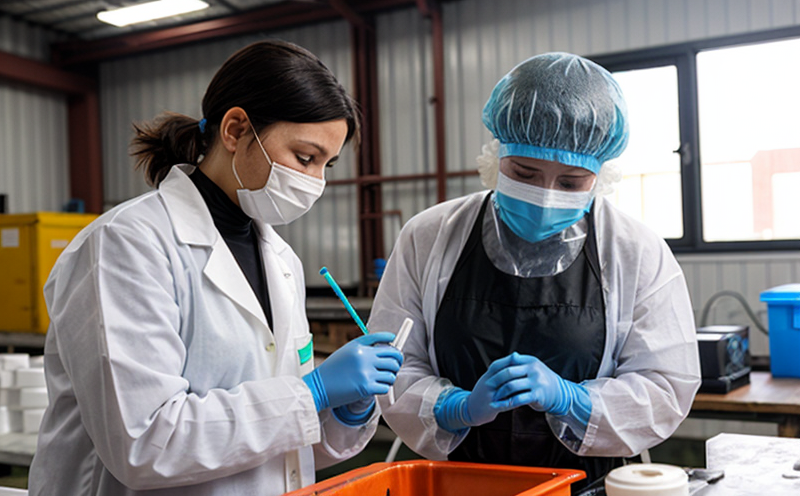Recycled Nanomaterials Testing
In recent years, there has been a significant shift towards the use of recycled materials in various industries. This trend is driven by both environmental concerns and economic incentives. Recycled nanomaterials are a prime example of this evolution, offering a sustainable solution to resource depletion while maintaining high performance standards.
Our laboratory specializes in providing comprehensive testing services for recycled nanomaterials, ensuring that these materials meet the highest quality and reliability standards. This service is crucial for industries such as electronics, pharmaceuticals, and automotive manufacturing, where the integrity of materials directly impacts product safety and efficacy.
The testing process involves a series of rigorous procedures aimed at evaluating the physical, chemical, and mechanical properties of recycled nanomaterials. Our state-of-the-art facilities utilize advanced instrumentation to ensure precise measurements and accurate results. We adhere strictly to international standards such as ISO 17892-3:2022 for testing carbon black in rubber products.
One of the key challenges in working with recycled nanomaterials is ensuring consistent quality across batches. Our team works closely with clients to understand their specific requirements and develop tailored testing protocols that address these challenges. This includes assessing factors such as particle size distribution, morphology, and surface area, all of which are critical for optimizing material performance.
Another important aspect of our service is the evaluation of potential contaminants in recycled nanomaterials. Given the diverse sources from which these materials are derived, it's essential to ensure that any impurities do not compromise product quality or safety. We employ sophisticated analytical techniques to identify and quantify trace elements and other contaminants.
Our commitment to excellence extends beyond technical proficiency. We provide comprehensive reports detailing our findings, along with recommendations for improvement where necessary. This holistic approach allows clients to make informed decisions about the use of recycled nanomaterials in their products or processes.
- Physical Properties: Testing includes density, specific surface area, and morphology.
- Chemical Composition: Analysis of elemental composition and identification of potential contaminants.
- Mechanical Properties: Evaluation of tensile strength, flexural modulus, and impact resistance.
Quality and Reliability Assurance
The quality assurance process for recycled nanomaterials is critical to ensuring that these materials meet the stringent requirements of modern manufacturing processes. Our team employs a multi-step approach, combining advanced analytical techniques with industry best practices.
We start by conducting initial screenings to identify any potential issues early in the testing process. This helps minimize delays and ensures that only high-quality samples proceed to further analysis. Once initial screenings are complete, we move on to more detailed evaluations using a range of sophisticated instruments.
Throughout this process, our team adheres strictly to international standards such as ASTM D792-18 for determining the density of plastics and rubber. This ensures consistency and accuracy in our results, which is essential for maintaining trust with clients and regulatory bodies alike.
A key aspect of our quality assurance program is our commitment to continuous improvement. We regularly review our methods and procedures to ensure they remain up-to-date with the latest scientific advancements. By doing so, we can provide even more accurate and reliable testing results.
Environmental and Sustainability Contributions
- Reduced Carbon Footprint: By utilizing recycled nanomaterials, we help minimize the environmental impact associated with the production of new raw materials.
- Resource Conservation: Recycled nanomaterials contribute to the conservation of natural resources by reducing the demand for virgin materials.
- Economic Benefits: The use of recycled nanomaterials can lead to cost savings for businesses, making them more competitive in the market.
The shift towards recycling is not just beneficial from an environmental perspective; it also offers significant economic advantages. By leveraging these materials, companies can reduce their reliance on raw material suppliers and lower production costs. This makes recycled nanomaterials a valuable asset for businesses looking to enhance sustainability without compromising performance.
Competitive Advantage and Market Impact
The increasing demand for sustainable products is driving innovation across industries. Companies that adopt recycled nanomaterials early on can gain a competitive edge by demonstrating their commitment to environmental stewardship. This not only enhances brand reputation but also opens up new market opportunities.
By providing reliable testing services, we help our clients navigate the complexities of integrating recycled nanomaterials into their products or processes. Our expertise ensures that these materials meet all necessary quality and safety standards, thereby reducing risks associated with non-compliance.
The use of recycled nanomaterials can also contribute to brand differentiation. In a crowded marketplace, companies that prioritize sustainability are likely to attract eco-conscious consumers who value ethical production practices. This can lead to increased market share and customer loyalty.





